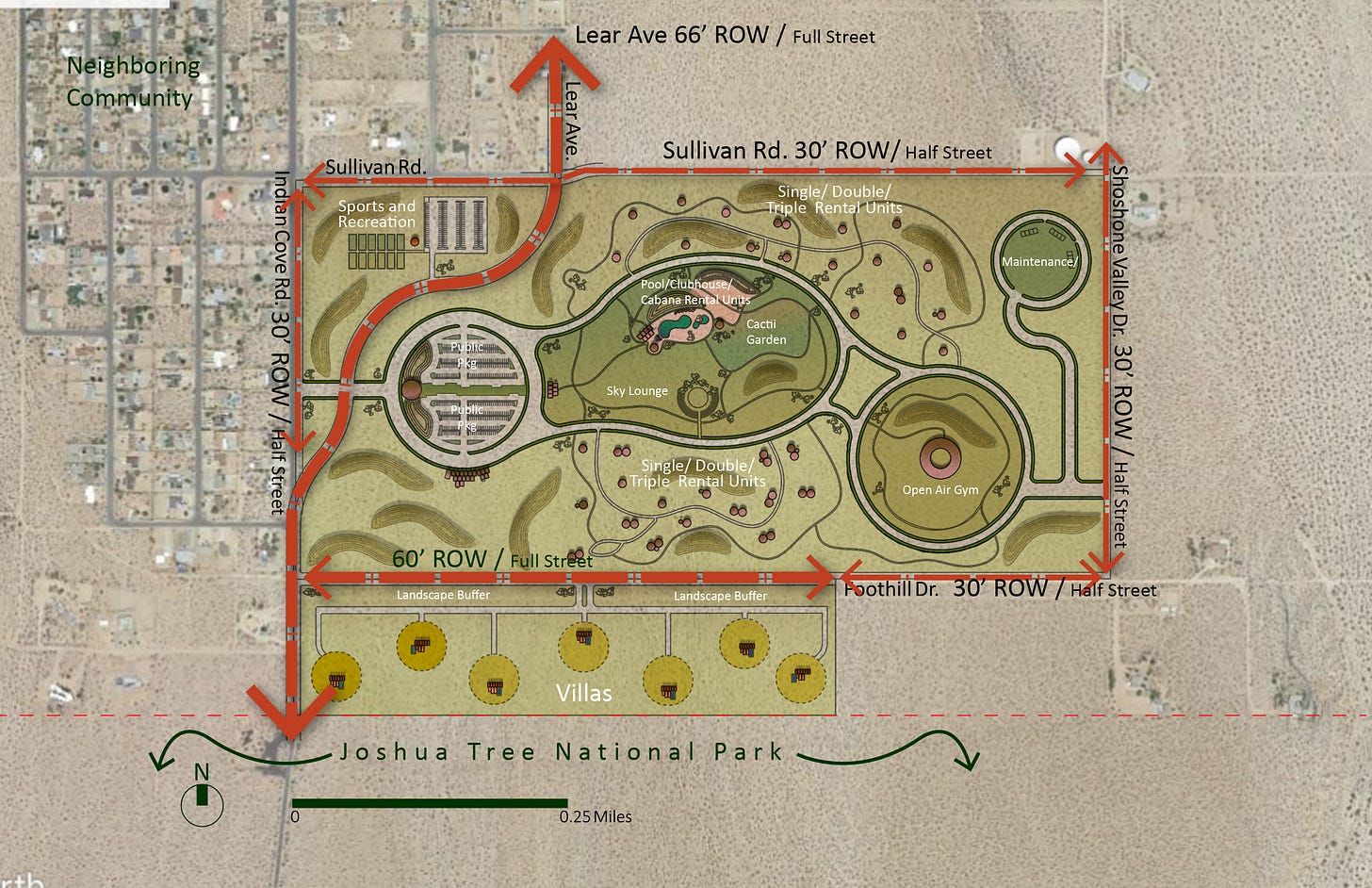INDIAN COVE RESORT PROPOSAL ON SHAKY GROUND
Escrow is extended, City and JTNP feedback point towards revisions and full CEQA
Desert Trumpet has acquired copies of the development pre-application feedback from the City of Twentynine Palms and Joshua Tree National Park on the “resort” planned for a 218 acre JTNP-adjacent parcel in Indian Cove.1 Both letters are great examples of official feedback on development of environmentally sensitive land, with the Park and the City pointing to issues needing resolution should the development proceed. These include traffic circulation, watershed and storm management, wildlife and Park views. The City letter concludes that the project will require “a complete CEQA2 initial study” and is subject to Tribal consultation. The letters are attached to this article, above.
The “pre-app” was submitted on March 24 by Wilshire Group LLC represented by Joubin Sedgh includes a preliminary plan designed by Land Studio. Feedback from several agencies was requested on March 31. Close of escrow on the property was scheduled for June 20, but was postponed pending receipt of City feedback which was submitted on June 23. Sources indicate that the realtor isn’t sure when or if the escrow will close. While City has recommended that Sedgh meet with local residents since he first contacted the City in November 2021, a meeting has yet to take place.

The JTNP letter, submitted on May 17, is focused on wilderness, wildlife and encroachment on the Park by resort guests pointing to villas located on the edge of the park and a general history of “numerous examples of illegal dumping, trail development, motorized use, and mechanical use of wilderness areas” by area visitors and residents despite signage and fencing.
Both letters discuss the impact the resort would have on wildlife. The City indicates that “the eastern portion of the proposed project is located in a Wildlife Corridor Overlay per the General Plan”: The intent of the Wildlife Corridors Overlay is to preserve the ecological function of the wildlife corridors by establishing a set of development standards and site design patterns that allow the movement of protected special through the wildlife corridors. The city goes on to suggest that the eastern side of the property, bordered by Shoshone Valley Road, “remain undeveloped in its natural state.”
The JTNP letter is more specific: “This development, not unlike other developments in the local area, will attract predators of desert tortoise especially coyote and common ravens. Since this proposed action is directly adjacent to JTNP, it is expected that this development will have direct, negative affects to the desert tortoise through predation of juvenile tortoises within JTNP boundaries.” JNTP also indicates that the resort contains features which could impact wildlife migration patterns.
JTNP indicated that it “expects to be apprised and be provided the opportunity to review and comment on the disclosure of environmental effects identified through the CEQA process. We expect there will be environmental effects on the parcel itself, but also to adjacent NPS land that will require mitigation.” The Park also points to a proposed subdivision adjacent to the resort parcel where a letter of concern was submitted yet the City failed to acknowledge concerns or keep the Park updated.
The City letter also includes a discussion of circulation, land use and general plan issues including the current zoning, the definition of a “resort”, the number of units that could potentially be built, and an examination of required improvements to Lear, Sullivan, Foothill/Baseline and Shoshone Valley Roads.
Of particular interest to Indian Cove residents, the City acknowledges that:
The Indian Cove community is not presently served by any public parks. There is a need for a community park as identified in the City’s Parks and Recreation Masterplan. It is recommended that the application consider creating a park open to the public, or perhaps donating land to the City for this purpose, that would largely serve the Indian Cove community.
While some neighbors of the project have indicated being open to a yoga / meditation retreat and/or a project that is more limited in scope leaving a portion of the property untouched, others prefer that the full parcel remain undeveloped and be purchased by the Mohave Desert Land Trust and/or Joshua Tree National Park. With a new close of escrow target of mid-July, they may soon learn the fate of
this pristine piece of desert land.
Disclosure: The author lives in the vicinity of the proposed development
CEQA stands for the California Environmental Quality Act: “CEQA requires public agencies to “look before they leap” and consider the environmental consequences of their discretionary actions. CEQA is intended to inform government decisionmakers and the public about the potential environmental effects of proposed activities and to prevent significant, avoidable environmental damage.”


